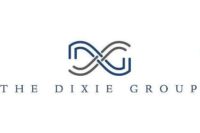Dixie Group reports quarterly and year-end losses
CHATTANOOGA, Tenn. -- The Dixie Group Inc. has released financial results for the fourth quarter and year ended Dec. 30, 2000. For the fourth quarter, the company reported a net loss of $5.7 million, or 50 cents per diluted share, compared with net income of $3.1 million, or 26 cents per diluted share, for the same period last year. Fourth quarter 2000 sales were $136.9 million, down 8% compared with sales of $148.4 million for the same period in 1999.
For the full year 2000, the company reported a net loss of $9.3 million, or 81 cents per diluted share, compared with net income of $17.2 million, or $1.47 per diluted share, for 1999. Sales for the year 2000 were $568.1 million, down 5% compared with $597.9 million in the prior-year period.
Fourth quarter 2000 operating results were negatively affected by low sales volume and non-cash, pre-tax charges of $5.6 million to write down assets, including a dyeing facility closed during the quarter. In addition, the cost of curtailing production to reduce inventory levels and the cost to consolidate manufacturing facilities and operating systems was approximately $3.5 million pre-tax. The results also included a gain of $1.7 million from the sale of certain non-critical assets. These unusual costs, net of the gain, reduced earnings per diluted share by approximately 39 cents in the fourth quarter.
Results for the fourth quarter and full year ended Dec. 30, 2000, included an after-tax gain reflecting the adjustment of discontinued textile operations, sold in June 1999, of $800,000, or 7 cents per diluted share, compared with a gain from discontinued operations of $400,000, or 3 cents per diluted share, in the fourth quarter 1999 and $4.8 million, or 41 cents per diluted share, for the year ended Dec. 25, 1999.
"Production during the fourth quarter was substantially lower than anticipated due to the decline in sales," commented Daniel K. Frierson, chairman and CEO. "Significant weakness in the factory-built housing market and softness in our other markets during the latter part of the fourth quarter 2000 caused sales to decline approximately 14% below our expectations.
"In response to these issues, we acted to bring costs in line with anticipated revenues. In addition to consolidating our North Georgia tufted manufacturing operations, a process which now is substantially complete, we are aggressively cutting non-essential costs. We reduced salaried personnel in our North Georgia operations by approximately 15%, or 80 associates; closed an inefficient dyeing operation; sold certain non-critical assets, and are evaluating our options for other non-strategic assets. These actions are intended to substantially reduce costs, lower debt, and improve our competitive position going forward.
"Our high-end business at Masland and Fabrica continues to show improvement in growth and profitability, but Carriage's sales to the factory-built housing industry remain below prior-year levels. These sales have, however, shown significant improvement in January 2001 compared with the December 2000 period. We are optimistic that sales volume will continue to improve and that the cost reductions we have made will enable us to return to profitability by the second quarter of 2001. If this trend of improving sales continues, we expect to report earnings for 2001 of at least 50 cents per diluted share," said Frierson.
Looking for a reprint of this article?
From high-res PDFs to custom plaques, order your copy today!




